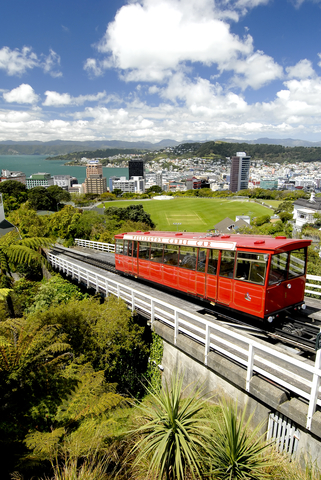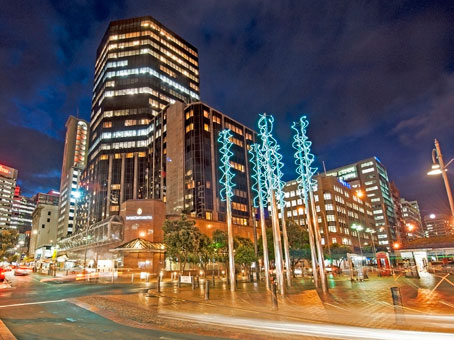
[Updated Oct 2020] A guide to serviced offices and office space to rent in Wellington as well as general information that may be useful if you are considering renting offices and workspace in the city.
For further Wellington offices information or to search for office space to rent in Wellington just click. Or contact us for any office space search query.
History & Geography
The capital of New Zealand is a city of almost 400,000 that sits on the southwestern edge of the country’s North Island. Nestled between the Rimutaka Ridge and Cook Strait, the city is the official seat of the Wellington Region. The Maori Kupe tribe were the first to discover and explore the region around Wellington, though before Europeans arrived there were no major settlements in the area. In September 1839 settlers from the New Zealand Company arrived in the area on the ship Tory. They proceeded to establish a settlement in what is now the suburb of Petone. The town quickly grew and was named Wellington, after the Duke of Wellington, the British Prime Minister from 1828 to 1830. Wellington was made the capital of New Zealand in 1865, controversially taking the place of Auckland, which had been the nation’s capital up till then. The reason behind the move was that it was believed at the time that South Island might secede and form its own separate colony. Wellington was selected primarily because of its good harbour and strategically advantageous central position between the two islands. In July 1865 the New Zealand parliament officially met for the first time in the city. At this time the city also became the location of the Supreme Court and Government House, the official residence of the Governor-General. In 1848 and 1855 the city sustained major damage following earthquakes. In particular the 1855 Wairarapa quake was especially severe. After both earthquakes, Wellington was extensively rebuilt. Over the years the capital expanded and today covers 171 square miles. In the early 2000s, Wellington experienced a property boom which saw house prices skyrocket, only for the bubble to burst with the advent of the global economic crisis in 2008. Today the city is a regional economic powerhouse as well as a centre of New Zealand culture and politics.
Economy
As the capital of New Zealand, the public sector is one of the bulwarks of Wellington’s economy. Thousands of the city’s residents work in some sector of the government or courts, and economic health of the government has traditionally had a large impact on the economy of the city. Heavy industry, finance, and technology are also major industries in Wellington. Many of the city’s population are young professionals who prefer to live near the city’s CBD. A recent survey found that the average resident of the city was aged 24 to 35 and worked in the downtown area in a professional job. Since New Zealand instigated far-ranging deregulation and privatization laws Wellington has prospered from new business moving to the city. Because of its central location in the country, many major companies have moved their headquarters to Wellington. Among these are Datacom Group, KiwiRail, Todd Corporation, TradeMe, Centreport, Chorus, and Zero. Arts and culture, film, and ICT have also been burgeoning for the last few years. And of late Wellington’s tourism industry has been expanding significantly, with an ever greater percentage of the country’s GDP being made up of tourism dollars.
Tourism & Culture
While not traditionally a tourism mecca, Wellington does have an increasing amount of visitors and is managing to build a thriving tourism industry. Wellington centred its campaign to boost tourism on the phrase ‘the coolest little capital in the world’, and the statistics show that it has been effective. Tourism adds NZD 1.3 million to the city’s economy annually and in 2010 visitors to the city increased by a full 60 percent. Wellington has also become a favoured destination for conferences and trade shows. In 2011 alone Wellington hosted over 6,000 conference events. The city has also become a favoured destination for cruise ships, and 125,000 passengers and crew visited the city in 2011. Wellington has a predominant café culture as well as a respected restaurant scene. New Zealand is famous for its dishes of lamb, pork, mussels, New Zealand shellfish, and sweet potatoes. A wide range of museums also calls Wellington home, the most famous of which are Te Papa (Museum of New Zealand, Museum of Wellington City & Sea, Colonial Cottage, the New Zealand Cricket Museum, and the Wellington City Art Gallery. Of course, the city also has a range of beaches and water sports are a popular pastime for both tourists and locals.
Transportation
Wellington is served by the Wellington International Airport, located approximately 3.7 miles from the city centre. The airport provides flights to other destinations in New Zealand, as well as Australia. Wellington itself is served by an extensive bus and rail system, though many of its residents choose to commute to work by foot. The city also has a ferry terminus from which ferries to Picton in the South Island go several times per day. There are also ferries to Eastbourne, Seatoun, and Petone.

Office space rental in Wellington
Overall Wellington has a fairly healthy and vibrant office market. Currently, the vacancy rate is approximately 11.9 percent and the prime rent is NZD 550 per square metre per month. Wellington has a two-tier market between Grade A and Grade B office space. Each display a markedly different trend in both rental and vacancy rates. Currently, there is a large amount of redevelopment taking place in the city centre and a number of projects in the pipeline. Many buildings are currently being retrofitted for earthquake protection. Rents are expected to remain steady in the foreseeable future.
There is a growing number of flexible workspaces in Wellington including serviced offices, managed offices and co-working spaces.
Our office space search, advisory and acquisition services are FREE, always. We are globally regulated by the Royal Institution of Chartered Surveyors (RICS) ensuring the highest standards of commercial property advice and service at all times.
